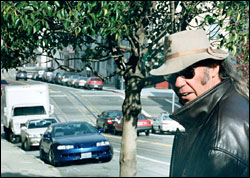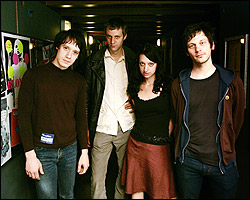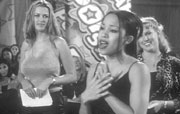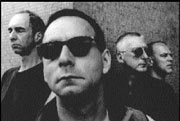EARLY IN THE COEN brothers’ masterful Raising Arizona, the infertile Ed (Holly Hunter) and Hi (Nicholas Cage) attempt to adopt a child the legal way. The adoption agent accesses Hi’s pile of felony convictions and looks at the couple like they’re crazy. Hi tries to reason with the guy, saying he knows he’s made some mistakes but that Ed is an upstanding, twice-decorated officer of the lawdon’t their uneven deeds even out? As far as the agency dude is concerned, it’s a no-go. But when it comes to me and Neil Young’s somewhat similarly spotty rap sheet, this reasoning works just fine.
In over 35 years making musicwith pretty much a release per yearYoung has issued some real stinkers. (Please don’t see 1983’s quasi-rockabilly Everybody’s Rockin’because, believe me, they weren’t). But taken with perfect albums like Harvest and deliberately over-the-top, 14-minute epics like “Change Your Mind,” it all evens out. Not all artists deserve such diplomacy, but with Young you just have to politely hold your nosehit the skip button, adjust the needle, whicheverand tiptoe over the missteps. Hell, if I’d been that adoption agent, I would’ve done the same with Hi and Ed. Remember how much they loved little Nathan Jr.? Sure, they weren’t entirely on the up and up, but they loved that kid like nobody’s business. That shit was real.
So is Neil Young’s. And since we’re on the subject of family, let’s discuss Young and Crazy Horse’s new Greendale (Reprise) first. Released simultaneously with four remastered, rereleased, never-before-on-CD back-catalog albums, Greendale is a concept record about a little town and a troubled family who lives there, accompanied by a DVD that tells the same story, more or less, in movie format. Although at first I dismissed most of Greendale as way too homogenous, time showed me how sweet it isalthough I’m still sort of dismayed that at least five of the songs are essentially the same country-blues strummers, with the lyrical matter providing the only real variation.
But, as it turns out, that sameness serves a purpose on, and in, Greendale. The bluesy riffs and shuffling beats are the sounds of the townthe setting, as it wereand the songs are chapters. Like the best of Young’s output, the overall affair is fairly ambitious, and he places a lot of faith in his listeners. With its extensive liner notes and DVD, Young has crafted his version of a multimedia novel. That Young’s father, Scott, was a novelist makes sense: By all accounts, the Young family was not idyllic, but apples have the habit of falling pretty close to their treeseven when they later roll far away. The album’s standout track, “Bandit,” is one of Young’s trademark downers. With its one beautifully broken note placed perfectly inside the acoustic-guitar melody and the spoken-sung refrain “Someday/You’ll find/Everything you’re looking for,” the track brings you so far down you simply have to look up. It reminds me of “Razor Love” from 2002’s Silver and Gold, and also of the melancholic title track from one of the new rereleases, 1974’s On the Beach.
AS CHRONICLED BY Young’s biographer Jimmy McDonough in last year’s definitive Shakey, the making of On the Beach included plenty of illegal good times, in particular a very fun-sounding manipulation of marijuana called a “honey slider.” There’s a lot of druggy, spacey abstraction on Beach; it’s full of slow drones and Southern-fried Velvet Underground moods. “The world is turning/I hope it don’t turn away,” sings Young.
But if Beach was a pretty mess of medicinal confusion, 1977’s American Stars ‘n Bars is just plain confused. Now, Young is known for nailing country, rock, and folk with equal rigor, and if pressed, you could just call this a country-rock album, but even so, American Stars ‘n Bars feels muddled. Just as you start getting used to Linda Ronstadt’s backups painting the songs with a sweet and low-down flavor, “Like a Hurricane” comes in as if someone couldn’t wait for 1979, when Young and Crazy Horse would release Rust Never Sleeps, the record that perfected and blueprinted Young’s acoustic-to-electric ratio. Unless you’re a Ronstadt fanatic, there’s no reason to own this recordparticularly if you have “Like a Hurricane” on ’79’s Live Rust.
Immediately after the two Rust releases, Hawks & Doves and Re-ac-tor were released in quick succession. 1980’s Hawks is a nice recordits opener, “Little Wing,” is another one of those gorgeous, warm-blanket songs that Young rations out like a generous socialist in this cold world but it also contains some truly awful flirtations with new wave, such as the weird vocals in “Lost in Space.” But Re-ac-tor, originally released in 1981 (the same year Devo were “Through Being Cool” and became the New Traditionalists), is either a complete sham or a rushed contract obligationprobably both. Young and Crazy Horse engage in bizarre, embarrassing falsettos and make like Steve Miller’s wanky “Rock’n Me” in a nine-minute song about T-bone steaks, and then pull out one of the lamest songs in all of rock history pre-Creed, “Rapid Transit.”
What’s most curious about all of this is that Young, the outspoken, ardent opponent of digital recordings, would allow the rerelease of these LPs onto CD. Especially when you consider that only On the Beach is really worth compromising his standards. But Neil, you’re one of my biggest heroes. If granted three wishes, one of them would still be to try one of those honey sliders with you, so really, all is forgiven.
You too, Hi and Ed: All is forgiven.








